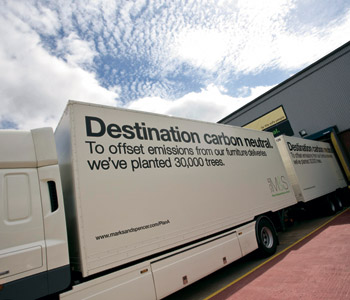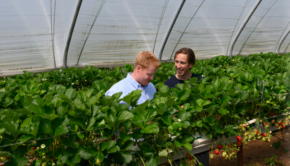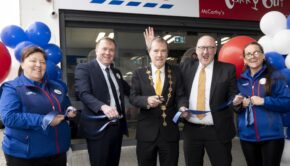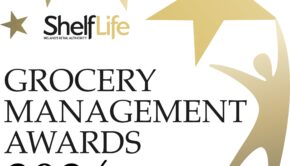Sustainable goals

Marks & Spencer’s head of sustainable business, Mike Barry talks to ShelfLife about the road to sustainability three years after launching an ambitious five-year plan
26 January 2010
 Since launching Plan A in January 2007, Marks and Spencer has been on a journey to shift its business to a 100% sustainable model by 2012, following a 100 point plan incorporating everything from waste reduction to animal welfare. Three years into its commitment, we met head of sustainable business Mike Barry to find out how it’s all going during the worst recession in living memory.
Since launching Plan A in January 2007, Marks and Spencer has been on a journey to shift its business to a 100% sustainable model by 2012, following a 100 point plan incorporating everything from waste reduction to animal welfare. Three years into its commitment, we met head of sustainable business Mike Barry to find out how it’s all going during the worst recession in living memory.
Are consumers still worried about ethical and environmental issues?
From our market research when we launched Plan A, 80% of consumers were telling us that, in some shape or form, they expected Marks & Spencer and other big business to take a lead on this issue. In the middle of the worst recession that any of us has ever seen, 80% still expect us to take a lead on it, but the subtle message is that ‘we want you, big business, to do a little bit more, but we as individuals want to do a bit less,’ because of their own present concerns.
Has M&S realised significant cost-savings since launching Plan A?
Yes. When we launched our sustainability plan across our UK and Irish operations, we said we’d spend £200 million over five years. A big cost, but we were in good times, making good profits.
Now we’re in the middle of a recession, surely it’s a little bit more scary now?
In practice, that £200 million cost has disappeared. So Plan A has shifted from an investment of hundreds of millions of pounds in more sustainable practices to savings of tens of million of pounds. Less energy, less water, less packaging, less waste, gives you cash at a difficult time. Plan A has moved to a cost neutrality, generating a cash surplus for over the next two and half years.
How does M&S’ ethical position sit with necessary restructuring or renegotiating with suppliers?
When we launched Plan A we also launched the Plan A Supplier Exchange, to which all our hundreds and thousands of suppliers have access. It shows them our best practice and how this can provide a business benefit to them: reducing costs by using less fuel, reducing energy and packaging. Investing in good work standards can drive productivity, so by sharing best practice we can help them. And we have given lots of support to suppliers on this.
However, we never take our eye off the ball when it comes to delivering value for our customers. That means we will always have good, sensible discussions with our suppliers about efficiency. What we’re saying is that Plan A can help us all become more efficient together.
Has the current environment affected commitments to source locally?
We will source Irish whenever we can. I think we have a good track record there – although there’s always scope for improvement and we can always move forward – but a significant proportion of the food on our shelves (in Irish stores) is produced in Ireland.
This is more of a socioeconomic issue as opposed to a climate change issue. Obviously, where food is local and not flown it reduces the carbon footprint. But in terms of Irish consumers knowing that their business is supporting Irish producers, we know that this is very, very important to them and we’re very clear on that.
Is organic still as important to M&S?
Organic sales across the whole market, in everybody’s shops, have suffered. We’ll watch how it rebounds as we move out of recession, and clearly we’ll keep on supporting it, but the key thing is really driving better environmental standards across the entire farming base.
Why is M&S anti-GMO?
We have a long-term position on not using GM (genetically modified) ingredients in our food, for the very clear reason that we don’t believe consumers, at this moment in time in Britain Ireland, want to eat GM ingredients.
How high a priority to M&S is sustainable fish?
As part of our plan we made a commitment towards 100% MSC (Marine Stewardship Council) certified fish or equivalent, and that’s the journey we’re on. We’re not claiming to have achieved it yet, what we’re saying is that all our fish is responsibly sourced or comes from a known source. We only sell fish that has come from a good source that meets M&S’ standards. By 2012 we want it all to be independently certified above and beyond what we’ve already done.
Does M&S actively advise consumers on sustainable choices?
Consumers have told us they want us to worry about it. M&S has 35,000 different food and clothing lines and there are 100 different sustainability issues in Plan A. You as a consumer could go mad shopping for 10 minutes in one of our stores, trying to think about all the issues. The whole premise of Plan A is simple Marks & Spencer reassurance. Whatever it is, you know that we’re working hard to do the right thing.
• Since meeting Mike Barry, M&S was the first to purchase GreenPalm certificates for 100% of palm oil use. It has also became the first UK company to sign the WWF’s Seafood Charter



 Print
Print






Fans 0
Followers